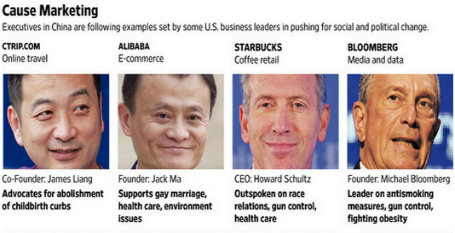Chinese Executives Start speaking out on Social Issues
In a country against such public debate, several Chinese executives have started commenting on social and political issues to enhance their reputations.
Companies have taken issue with China’s fading one-child policy, under which the authorities fined those who had more than one child. Beijing significantly relaxed the policy in 2013 such that couples could two children if one spouse can prove they a single child. No significant birthrate rise has happened and critics say more needs to be done to raise the birthrate. Executives have also taken on issues on gay rights.
James Liang, the co-founder and chief executive of travel site Ctrip.com International Ltd., is one of a number of executives encouraging employees to have more children as China begins to shed its one-child policy.
Ctrip.com’s childbirth inducements include interest-free loans for employees in excess of the government fines they would have to pay for violating the relaxed one-child policy. Other companies offering similar support include a property developer and a maker of drainage systems.
Encouraging more births “is something that the government should be doing,” said Mr. Liang. Without a full labor pool, he said, China risks becoming a society that lacks competition and innovation.
The Communist Party, long severe in its effort to squelch debate, has intensified its crackdown to ensure that liberal economic policies of recent years not be confused with tolerance of dissent. Since Chinese President Xi Jinping came to power about two years ago, government curbs have ranged from tightened Internet controls to seizing prominent lawyers and activists.
Some growing Chinese companies are testing the limits anyway, experts say. Many are seeking ways to develop their brands with social messages, much in the same way as have U.S. companies like Google Inc. and Starbucks Corp.
Companies have taken issue with China’s fading one-child policy, under which the authorities fined those who had more than one child. Beijing significantly relaxed the policy in 2013 such that couples could two children if one spouse can prove they a single child. No significant birthrate rise has happened and critics say more needs to be done to raise the birthrate. Executives have also taken on issues on gay rights.
James Liang, the co-founder and chief executive of travel site Ctrip.com International Ltd., is one of a number of executives encouraging employees to have more children as China begins to shed its one-child policy.
Ctrip.com’s include interest-free loans for employees to encourage childbirth which exceed the government fines they would have to pay for violating the relaxed one-child policy. Other companies offering similar support include a property developer and a maker of drainage systems.
Encouraging more births “is something that the government should be doing,” said Mr. Liang. Without a full labor pool, he said, China risks becoming a society that lacks competition and innovation.
The Communist Party, long severe in its effort to squelch debate, has intensified its crackdown to ensure that liberal economic policies of recent years not be confused with tolerance of dissent. Since Chinese President Xi Jinping came to power about two years ago, government curbs have ranged from tightened Internet controls to seizing prominent lawyers and activists.
Some growing Chinese companies are testing the limits anyway, experts say. Many are seeking ways to develop their brands with social messages, much in the same way as have U.S. companies like Google Inc. and Starbucks Corp.

